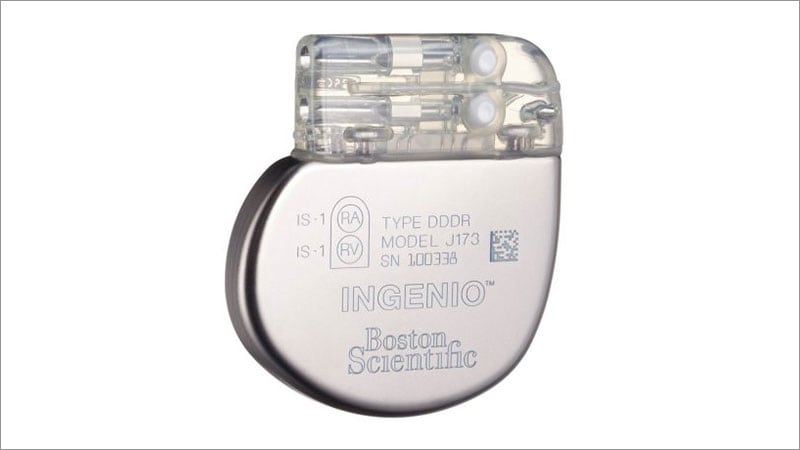Boston Scientific has recalled the INGENIO family of pacemakers and cardiac resynchronization therapy pacemakers (CRT-Ps) because the devices may incorrectly transition to safety mode.
Safety mode on the devices is intended to provide backup if the device is faulty.
However, in safety mode, there is a risk of inappropriate loss of pacing due to sensing of muscle contractions. If the device incorrectly goes into safety mode, the device cannot be reprogrammed and must be replaced, the US Food and Drug Administration (FDA) said in a recall notice posted on its website.
“The use of affected product may cause serious adverse health consequences, including loss of pacing or ability to regulate heart rate, worsening of heart failure, and death,” the agency said.
The FDA has labeled the recall as Class I, the most serious type, because of the potential for serious injury or death.
There have been 65 reported incidents, including three injuries that required patients to receive temporary external pacing. There have been no reports of death to date.
The recall covers 48,000 of the company’s ADVANTIO DR EL, INGENIO DR EL, and VITALIO DR EL models, manufactured from September 2011 to December 2018 and distributed in the United States between November 1, 2011, and August 1, 2020.
The model numbers on the recalled products are J174, J177, K174, K184, and K187.
Boston Scientific has sent an “Important Medical Device Advisory” to all affected customers.
The letter recommends considering patient-specific factors (including underlying health issues, pacemaker dependence, or problems with pacing) when assessing potential risk for a patient if their device incorrectly transitions to safety mode.
If a device incorrectly enters safety mode, a replacement should be scheduled.
Preventive replacement for affected devices is not recommended. However, for individual patients, shared decision-making may support consideration of early device replacement to prevent unintended outcomes.
In these cases, for EL pacemakers, if early replacement is planned, replacement should be scheduled when the service life of the device is 4 years (or less, if the device currently indicates less than 4 years remaining).
For CRT-Ps, if early replacement is planned, replacement should be done when the remainingservice life of the device is 3 years (or less, if the device currently indicates less than 3 years remaining).
The letter also advises performing a system check remotely or in person at least every 12 months. For patients who may not require early device replacement, existing follow-up procedures should be continued until there is 1 year of service life expected and then follow-up every 3 months until replacement (as indicated in the device’s instructions for use).
For a patient with an affected device, the Boston Scientific medical device advisory should be added to their medical record to maintain awareness of this topic for the remaining service life of the device.
Adverse events related to this recall should be reported to Boston Scientific or the FDA’s MedWatch Adverse Event Reporting program.
Explanted devices should be returned to Boston Scientific. A return product kit is available by calling Boston Scientific’s Customer Service Department at 1-800-CARDIAC (227-3422) or 651-582-2698.
